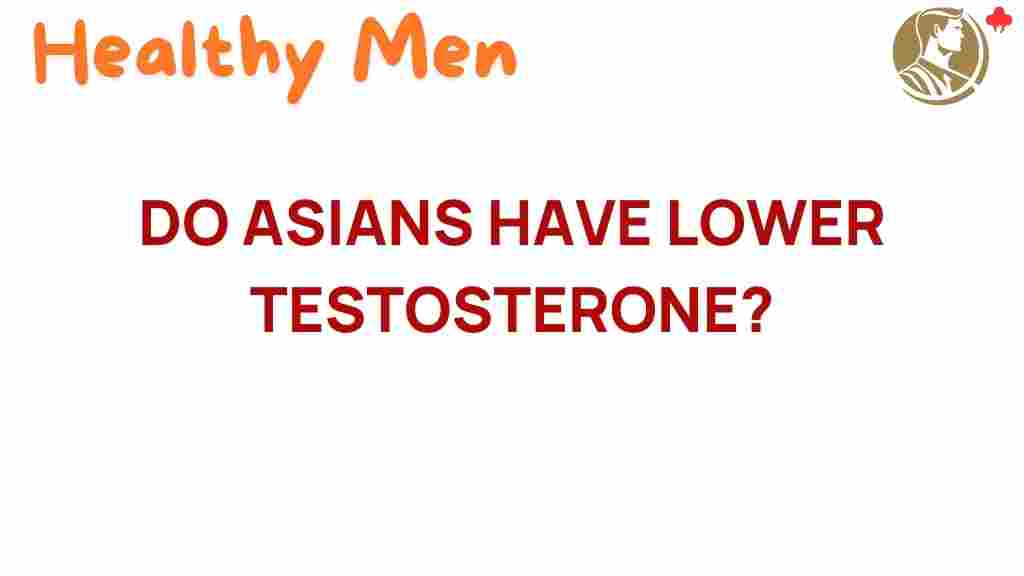Unpacking the Myths: Do Asians Have Lower Testosterone Levels?
Testosterone is often seen as a symbol of masculinity, strength, and vitality. As one of the primary male sex hormones, it plays a crucial role in various bodily functions, including muscle mass, fat distribution, bone density, and overall wellness. However, there is a pervasive myth suggesting that testosterone levels vary significantly among different ethnic groups, particularly regarding Asian men. In this article, we will explore the myths surrounding testosterone levels in Asians, examining cultural factors, genetics, health implications, and the broader context of masculinity.
Understanding Testosterone and Its Importance
Before we dive into the myths, it’s essential to understand what testosterone is and why it matters. Testosterone is produced primarily in the testes in men and in smaller amounts in the ovaries in women. Here are some key functions of testosterone:
- Development of Male Characteristics: Testosterone is responsible for the development of male secondary sexual characteristics, such as body hair, deeper voice, and increased muscle mass.
- Regulation of Libido: It plays a vital role in sexual desire and function.
- Bone and Muscle Health: Testosterone contributes to bone density and muscle strength, which are crucial for physical health and athletic performance.
- Mood and Energy Levels: It influences mood and energy, with lower levels often linked to fatigue and depression.
Myths About Testosterone Levels in Asians
One of the most common myths is that Asians, particularly men, have lower testosterone levels compared to their counterparts from other regions. This myth has been perpetuated by anecdotal observations and cultural stereotypes. But is there any scientific basis for this claim? Let’s explore.
1. Cultural Factors Influencing Perceptions of Masculinity
Cultural beliefs play a significant role in shaping perceptions of masculinity and health. In many Western cultures, high testosterone levels are often equated with traditional masculine traits such as aggression, competitiveness, and physical strength. In contrast, many Asian cultures emphasize different values, such as harmony, respect, and collectivism. This cultural divergence can lead to misunderstandings about what it means to be masculine.
For instance, while Western media often glorifies hyper-masculinity, Asian representations may highlight more subdued or intellectual masculine traits. This can create a perception that Asian men are less masculine or, by extension, have lower testosterone levels.
2. Genetics and Hormone Levels
Genetics can influence hormone levels, including testosterone. However, it is crucial to note that testosterone levels vary widely among individuals regardless of ethnicity. Studies have shown that while there may be slight variations in average testosterone levels among different ethnic groups, these differences are generally not significant enough to support broad stereotypes.
Research indicates that factors such as age, body composition, health status, and lifestyle choices have a more substantial impact on testosterone levels than ethnicity. For example:
- Age: Testosterone levels naturally decline with age.
- Obesity: Higher body fat percentages are linked to lower testosterone levels.
- Health Conditions: Certain health issues like diabetes or hormonal disorders can affect testosterone production.
Scientific Studies on Testosterone Levels in Asians
To understand the truth behind these myths, let’s review some scientific studies that have measured testosterone levels across different populations.
Several studies have attempted to quantify testosterone levels in Asian men. For instance, a comprehensive study published in the Journal of Clinical Endocrinology & Metabolism analyzed testosterone levels in various ethnic groups, including Asians. The findings indicated that while there were some differences, they were not substantial enough to conclude that Asian men uniformly have lower testosterone levels.
Another important study focused on Southeast Asian populations and found that while there were variances in hormone levels, lifestyle factors—such as diet, physical activity, and stress—were significant contributors to these differences.
The Role of Lifestyle and Health in Testosterone Levels
It is essential to consider how lifestyle choices and health can impact testosterone levels, regardless of ethnicity. Here are some factors that can influence hormone levels:
- Diet: Nutritional choices significantly affect hormone production. Diets rich in healthy fats, proteins, and micronutrients support testosterone production.
- Exercise: Regular physical activity, especially strength training, can boost testosterone levels.
- Sleep: Quality sleep is crucial for overall hormone regulation, including testosterone.
- Stress: Chronic stress elevates cortisol levels, which can negatively impact testosterone production.
Troubleshooting Low Testosterone Levels
If you or someone you know is experiencing symptoms of low testosterone, such as fatigue, decreased libido, or mood changes, consider the following steps:
- Consult a Healthcare Provider: Seek professional advice for accurate diagnosis and treatment options.
- Get Hormone Levels Tested: A simple blood test can provide insights into your testosterone levels.
- Review Lifestyle Factors: Assess diet, exercise, sleep, and stress management strategies.
- Consider Natural Supplements: Some supplements, such as zinc and vitamin D, may support testosterone levels.
Conclusion: Debunking the Myths
In conclusion, the notion that Asians have lower testosterone levels than other ethnic groups is largely a myth rooted in cultural stereotypes and misunderstandings. While there can be individual variations in hormone levels influenced by genetics, age, and lifestyle factors, these differences do not warrant broad generalizations about entire ethnic groups.
Understanding the role of testosterone in health and wellness is vital for men of all backgrounds. Promoting a healthy lifestyle and addressing any hormonal concerns with a healthcare provider can lead to improved well-being. It’s time to move beyond outdated myths and embrace a more nuanced understanding of masculinity that respects cultural diversity and individual differences.
For more information on health and wellness, check out our detailed guide on men’s health and hormone balance.
This article is in the category Conditions and created by healthymen Team
